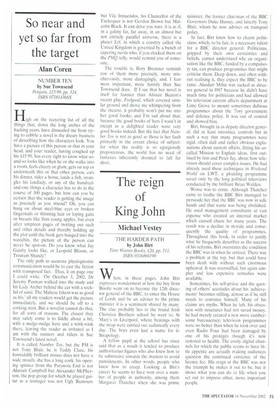So near and yet so far from the target
Alan Coren
NUMBER TEN by Sue Townsend Penguin, 05.99, pp. 324, ISBN 071814368X High on the teetering list of all the things that, down the long arches of the hacking years, have dissuaded me from trying to cobble a novel is the dreary business of describing how the characters look. You have a picture of this person or that in your head, and your reader, having coughed up his £15.99, has every right to know what soand-so looks like when he or she walks into a room, feels cheery or glum, gets on top or underneath this or that other person, eats his dinner, rides a horse, lands a fish, strangles his landlady, or any of the hundredand-one things a character has to do in the course of 300 pages, but how can you be certain that the reader is getting the image as precisely as you intend? Oh, you can bang on about steel-blue eyes or broken fingernails or thinning hair or loping gaits or breasts like firm young apples, but even after umpteen pages of trotting out such and other details and thereby holding up the plot until the book gets bunged into the wastebin, the picture of the person can never be spot-on. Do you know what Jay Gatsby looks like, or Leopold Bloom, or Tristram Shandy?
The only path to accurate physiognomic communication would be to cast the fiction with transposed fact. Thus, if on page one I could write, On October 3, 2002, Dr Jeremy Paxman walked into the study and hit Lady Archer behind the ear with a sockful of sand. The Maltese falcon was as good as his,' all my readers would get the picture immediately, and we should be off to a corking start. But a novelist cannot do that, for all sorts of reasons. The closest they may safely come is to fiddle about a bit, with a nudge-nudge here and a wink-wink there, leaving the reader as irritated as I am with the runners and riders in Sue Townsend's latest novel.
It is called Number Ten, but the PM is not Tony Blair, he is Teddy Clare, his formidably brilliant missus does not have a wide mouth, she has a long conk, his opening spinner from the Paranoia End is not Alastair Campbell but Alexander McPherson, the pop group for which he played guitar as a teenager was not Ugly Rumours but Vile Innuendos, his Chancellor of the Exchequer is not Gordon Brown but Malcolm Black. It can drive you nuts: it is as if, in a galaxy far, far away, in an almost but not entirely parallel universe, there is a planet Erf, in which a country called the Untied Kingdom is governed by a bunch of capering nerds who, if you clocked them on the PMQ telly, would remind you of someone.
The trouble is, Rory Bremner reminds you of them more precisely, more mischievously, more damagingly, and, I fear most important, more funnily than Sue Townsend does. If I say that her novel is itself far funnier than Alistair Beaton's recent play. Feelgood, which covered similar ground and drove me whimpering from the theatre, it probably won't put me into her good books; and I'm sad about that, because the good books of hers I wasn't in except as a delighted reader were very good books indeed. But the fact that Number Ten is not as good as those is her fault primarily in the errant choice of subject: for when the reality is so egregiously preposterous, the world has no need of fantasies inherently doomed to fall far short.


























































































 Previous page
Previous page